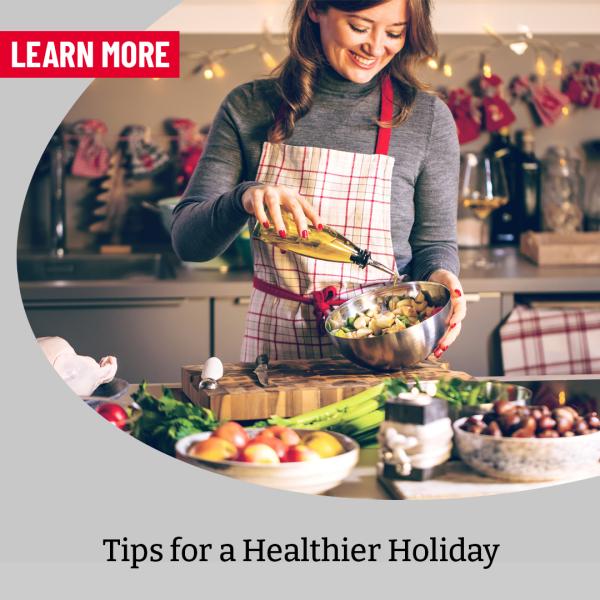Holiday Eating: Tips for a Healthier Holiday

Reviewed and contributions made by Lisa Gleason, Registered Dietitian/Nutritionist
So often the holidays come and go in a flurry of activity. From preparations to presents to parties, it can be difficult to manage all the happenings with a balanced diet and exercise routine.
But, with some additional planning, maintaining a balanced diet and exercise routine is doable. Moreover, it will keep both your energy levels (and your spirits) high. In fact, knowing your limits, making the right choices and sticking to a routine will actually allow you to remain in full control of your health this holiday season.
To better understand what steps we can take to safeguard our health from the never-ending holiday temptations, we compiled a list of holiday eating tips.
Get Your Free Physical Therapy Screening
Want to discover how you can benefit from physical therapy? Get a free screening and let us help you start the path to recovery today.
GET MY COMPLIMENTARY SCREENING
Don’t skip breakfast
While it may seem counterintuitive, avoid skipping breakfast (and other meals) to “save up” or “make room” for a big meal. Doing so may lead to poor food decisions and to overeating later in the day.
In addition, it is important to start your day with a balanced breakfast. This means avoiding all-carbohydrate meals, like cereal or pancakes. Instead, opt for a breakfast that includes protein, fat and carbohydrates. Examples include eggs or egg white omelet with veggies, nonfat Greek yogurt with berries or a protein shake. All options provide a more balanced meal that will prevent pre-meal snacking or overeating later in the day.
Offer to bring a vegetable-based side
Help out your host or hostess and bring a healthy appetizer or side to dinner. It is the easiest way to ensure that there will be something you enjoy at the meal that falls in line with your health goals. Ideas include bringing a veggie tray, soup or salad to share. Roasted vegetables are also a popular option and go well with many traditional holiday meals.
Whatever you decide to bring along, the key is to be mindful of ingredients. For example, if you are bringing a soup, opt for a broth-based recipe versus cream-based. If you enjoy salads, pay attention to the toppings as well as the dressing, which is where a lot of calories tend to hide.
Limit liquid calories
Holiday parties are a time to let loose and enjoy time with friends and family. But if you’re trying to watch your waistline, it’s important to be mindful of what’s in your glass and not just what’s on your plate. Wine, beer, spirits and other beverages can add up in calories fast.
For example, one 5-ounce glass of red wine has approximately 122 calories and one cup of regular eggnog amounts to 340 calories. If you plan on drinking, balance your alcohol and water intake. Or if you’d like to avoid heavy drinks altogether, there are many low-calorie alcoholic and non-alcoholic beverages available.
Snack smarter
For those of you who plan to travel any distance, make sure to pack healthy snacks on the plane or for the car ride. This can help you avoid less healthy fast food or airport food options. (Your wallet will thank you too.)
Even if you’re staying close to home around the holidays, stock up on healthy snacks to avoid overeating at meals and tame the temptation of holiday treats. Choosing snacks that include protein or fat will keep your hunger at bay. Some suggestions include a protein bar or shake, a handful of almonds/mixed nuts or jerky.
Fill your plate with vegetables first
Instead of reaching for the bread or even the main course, start your dinner by filling your plate with vegetables first. Aim for a half a plate of non-starchy vegetables like green beans, salad, asparagus, Brussels Sprouts or other available options. This will go a long way in helping to moderate calorie intake and avoid being hungry a few hours later.
For starchy vegetables like potatoes, corn, peas or winter squash, it is recommended to eat these in smaller portions. It is also recommended to balance them with other carbohydrates like bread, pasta, rice and sweets.
Eat until satisfied - not stuffed
While sometimes difficult, it is important to remember to slow down and enjoy your food, especially during a special meal.
To prevent that feeling of overeating consider:
- Portion sizes
- Chewing your food slowly
- Taking sips of water in between bites
- Checking in with your hunger level halfway through the meal
If you have gone through all these steps and still feel hungry, allow yourself permission to eat more until you feel satisfied. Likewise, if you are starting to feel full, it is okay to leave some food on your plate.
Maintain your activity level- or increase it!
Plan strategically to maintain your exercise routine during the holidays. With time off from work, kids off school and the likelihood to travel, exercise can end up on the back burner. Look ahead at your plans to pencil in the days on your calendar you can fit in activity.
In addition, to mitigate extra calories on holidays, start a new tradition of doing something active before or after a big meal. A brisk walk or some play time with the kids will help you keep on your feet and off the couch.
Take control of your nutrition, fitness level and health today
From tips to eating healthy on the run, to smart food shopping and home preparation, meeting with a nutritionist will help you create a healthy and well-balanced diet without giving up taste, convenience or the fun of eating. If you are interested in taking control of your nutrition or fitness this holiday season, or in the new year, ATI is here with nutritional assistance, physical therapy and athletic training to help you take control of your overall health.
